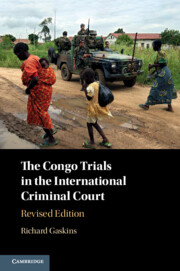Book contents
- The Congo Trials in the International Criminal Court
- The Congo Trials in the International Criminal Court
- Copyright page
- Dedication
- Epigraph
- Contents
- Acknowledgments
- A Laboratory for Global Justice
- Testing A New Court
- Back in Ituri
- The Bridge to the Hague
- 5 Battling Impunity in Ituri
- 6 ICC Structures, Dynamics, Tensions
- The Congo Trials
- Index
5 - Battling Impunity in Ituri
from The Bridge to the Hague
Published online by Cambridge University Press: 26 May 2022
- The Congo Trials in the International Criminal Court
- The Congo Trials in the International Criminal Court
- Copyright page
- Dedication
- Epigraph
- Contents
- Acknowledgments
- A Laboratory for Global Justice
- Testing A New Court
- Back in Ituri
- The Bridge to the Hague
- 5 Battling Impunity in Ituri
- 6 ICC Structures, Dynamics, Tensions
- The Congo Trials
- Index
Summary
The violence in Ituri also became the particular focus for international NGOs, which arrived on the scene largely after the main events had occurred. In an environment filled with intrigue and motivational obscurity, international groups sought to document serious atrocities, providing a direct source for master narratives taken up by the ICC Prosecutor. NGO reports showed their own evolution over time. At first, in covering violence across the whole eastern Congo, they laid the causes of disorder at the feet of national and regional players, with local groups merely caught in the crossfire. But the narrative changed in July 2003 when Human Rights Watch shifted to a criminological idiom. Using language from the Rome Statute, humanitarian agencies characterized the events in Ituri as crimes for which local actors should be held responsible under traditional legal paradigms. The moral battle against impunity for such crimes became a rallying cry that surrounded Hague legal proceedings with a sense of higher mission. The skeptical attack on victors’ justice was replaced with a new commitment to justice for victims, for which the ICC was the proper venue.
Keywords
- Type
- Chapter
- Information
- The Congo Trials in the International Criminal Court , pp. 131 - 161Publisher: Cambridge University PressPrint publication year: 2022

